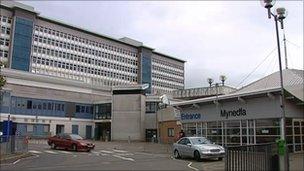A&E admissions up 250% at Cardiff hospital in freeze
- Published

People attending UHW's emergency unit leapt by 250% due to ice falls and slips
Accident admissions to Wales' largest hospital shot up by 250% this weekend, mostly due to falls and trips on ice.
The University Hospital of Wales in Cardiff said it was dealing with "a surge in demand" caused by the weather.
A total of 302 patients were seen during Saturday, and between midnight and 1000 GMT on Sunday 94 more arrived.
The health board said it was working to cope with the increased pressure and asked people only to go to A&E if absolutely necessary.
On Saturday, patients were left standing without seats in the hospital's emergency unit, one woman told BBC Wales.
Valerie Bram, from Cardiff, said she had to wait three hours before her 29-year-old daughter was treated for a broken arm at the hospital.
"There were people who had obviously fallen and damaged their legs or arms who couldn't get a seat," she said.
"There were large numbers of people - and nowhere to sit, some were just sat on the floor waiting to be seen."
Dr Bram, an applied linguist, said she raised the issue with staff at the hospital and said she was told they did not have the authority to get more chairs.
She said it was only at about lunchtime on Saturday that more seating was brought into the A&E area.
"What I want to know is who is running the hospital? Where were the managers and the decision-makers? Where was the forward planning?
"It was obvious that there would be more people going to the hospital with the weather conditions we have."
Cardiff and the Vale University Health Board said staff in acute and primary care were doing everything they could to help.
But it said a 250% increase in those attending the hospital's emergency unit meant the pressure was on for health staff to see and treat patients as quickly as possible.
Dr Graham Shortland, Cardiff and Vale UHW's medical director, said: "We are doing all we can to deal with this unprecedented increase in demand for services and are committed to making sure we continue to provide an excellent level of care during this very busy time.
"During cold periods like this A&E is extremely busy, so anything that can be done to reduce the pressures on the service will help and we would ask the public to support us with this."
Dr Shortland urged members of the public to consider whether they really needed to visit the hospital's emergency unit.
"For many people their first reaction when unwell is to come to A&E, but there are alternatives available if it is not an emergency such as NHS Direct or your local GP or pharmacist," he added.
"We would urge the public to help us ease the pressure and to avoid attending A&E unless it's absolutely necessary."
- Published4 December 2010
- Published3 December 2010
- Published2 December 2010
- Published30 November 2010